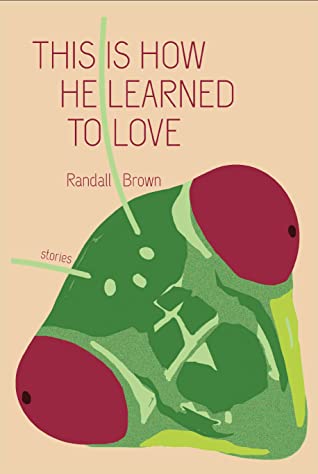
by Emily Webber
When I first read Randall Brown’s collection of micro-fiction, This Is How He Learned To Love, it was a very different world. By the time I started to write this review, everything was shifting, and a pandemic was on us. At least, I thought, in these uncertain times, when everyone is called to stay home, and the situation changes hourly, I’m lucky enough to be surrounded by books. Yet it has been hard to focus, and I found myself staring at the page of any book I started, my mind immediately racing to thoughts of my elderly parents, my son missing his friends, people already sick and dying. But when I picked up Brown’s collection to read again before finishing my review, my mind was finally quiet and focused. This Is How He Learned To Love is a collection of 37 short pieces; many of the stories are only a few sentences long, and only a couple are longer than a page. You can dip into these stories for a moment, and before your mind has a chance to wander back to the news, you’ve entered an entirely different world in just a few sentences.
These stories present a fleeting moment in a life, and yet from the details revealed, the reader can see into the past, present, and future of these characters creating a depth beyond the space the stories take up on the page. Genre aside, this collection is deeply grounded in the everyday and focuses on family relationships, illness, aging, addiction, and yearning for connection.
Brown’s sentence structure makes you want to read these stories out loud. In “Our Last Fishing Trip” a father and son spend a day fishing and leave things unsaid, with little interaction between them, even though there’s a desire to speak. The language is a litany of the ordinary details of a fishing trip that has a lulling rhythm while underneath the father and son seemingly fail to connect on a deeper level.
My father wondered aloud about water and time, the river through canyon, boulders turned to sand. We pulled on waders, dressed in fishing costumes, assembled our rods. An orange scud our fly of choice according to the guidebooks.
Brown’s titles do a lot of work in adding to the stories. “Yes, I knew” recounts a meeting between two former lovers. It’s funny and contains sharp details. The title reinforces the conversation the two lovers have, doubling the effect of it. “And So It Will Just Be the Two of Us” starts with an ordinary day for a family of four. The title acts as a premonition, making the father’s words more haunting when he asks the children if they understand how easily fire can get away. A kid digs in his yard and unearths a beer bottle in “Deliberately” while a pen of guinea pigs is left out in the hot sun. His mother calls out: “It wasn’t my job to watch them.” The title lends the story an even more menacing tone.
The strongest stories focus on missed family connections, like the above-mentioned “Our Last Fishing Trip.” In “Watch,” a boy plays in the snow and keeps an eye trained on the front window of the house, hoping someone is watching him. The story is six lines long and yet from “a towel for a scarf,” “the bare birches, the grey sky,” and of course the empty window, we know everything we need to know about this boy. In another story, “Skip A Life Completely,” two siblings stage an intervention and get their mother into detox, lamenting that she always chooses drink over them. One of the most shocking stories, “Like So Many Things In That Childhood,” begins with the startling image of a father hitting a dog while driving with his son. This story conveys a common theme in the collection: how people inherit anger and collapse into it, continuously turning away from each other even while hoping for connection.
And he looked at me for the last time and said something about anger, about it being there as long as he could remember, something inherited from his father, and I swerved from his final reach for me, told him I didn’t have it, had only the knife.
There are only very few stories, ones more surreal, that didn’t quite linger like the others but were enjoyable to read. Almost every story in this collection will transport you into the very real lives of others. In these glimpses into moments lived you will recognize resilience, the yearning to make things right and connect with others while battling addiction, pain, and loneliness. You may feel you have limited space for stories right now, but these tiny gems will grab hold before distraction sets in and act as a reminder that the basics of life—family, love, laughter, longing, trauma, and grief are always present in the world and reading stories offers comfort.
_______________________
 Emily Webber was born and raised in South Florida where she lives with her husband and son. She has published fiction, essays, and reviews in the Ploughshares Blog, The Writer magazine, Five Points, Maudlin House, Split Lip Magazine, and elsewhere. She’s the author of a chapbook of flash fiction, Macerated, from Paper Nautilus Press. Read more at www.emilyannwebber.com.
Emily Webber was born and raised in South Florida where she lives with her husband and son. She has published fiction, essays, and reviews in the Ploughshares Blog, The Writer magazine, Five Points, Maudlin House, Split Lip Magazine, and elsewhere. She’s the author of a chapbook of flash fiction, Macerated, from Paper Nautilus Press. Read more at www.emilyannwebber.com.

 The core workshop of SmokeLong Fitness is all in writing, so you can take part from anywhere at anytime. We are excited about creating a supportive, consistent and structured environment for flash writers to work on their craft in a community. We are thrilled and proud to say that our workshop participants have won, placed, or been listed in every major flash competition. Community works.
The core workshop of SmokeLong Fitness is all in writing, so you can take part from anywhere at anytime. We are excited about creating a supportive, consistent and structured environment for flash writers to work on their craft in a community. We are thrilled and proud to say that our workshop participants have won, placed, or been listed in every major flash competition. Community works.